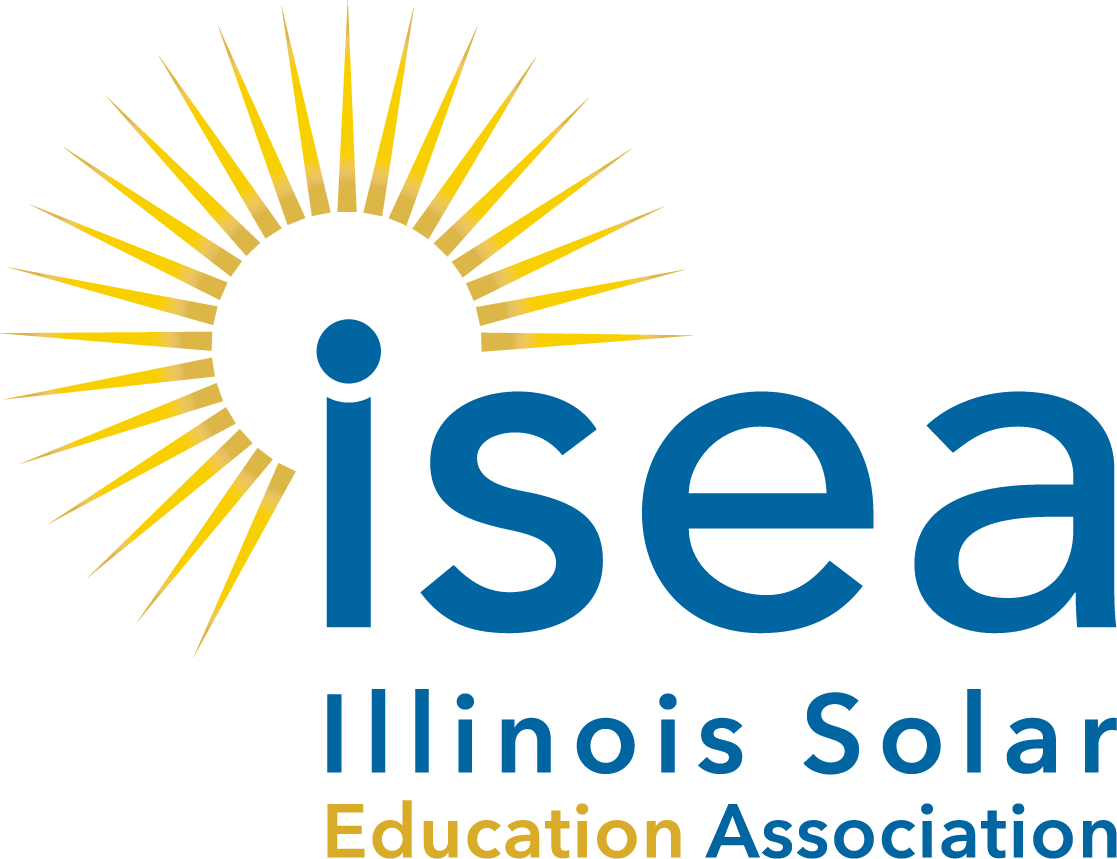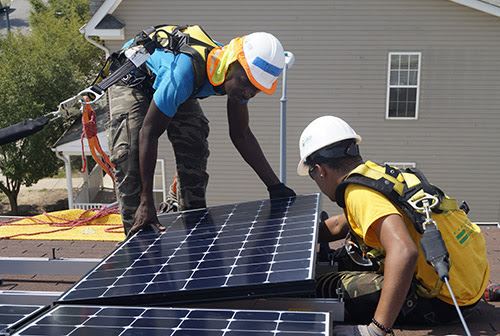Solar Professionals Resources
In the industry and need some assistance? Check out the following pages for information, links, and forms.
Illinois Power Agency Program Guidebook
The Adjustable Block Program Guidebook is a document created by the Adjustable Block Program Administrator to provide existing and prospective Program participants with necessary guidance about application requirements, participation requirements, Program processes, and other aspects of the Adjustable Block Program. The Program Guidebook works in conjunction with the Illinois Power Agency’s Long-Term Renewable Resources Procurement Plan to outline Program requirements for Approved Vendors and their subcontractors.
Distributed Generation Installer Certification
DG Certification for installers is
required in the state of Illinois. This page details a variety of paths
to take to get certified.
Educational Programs and Job Training
Looking to gain a little more training
for the job? This page walks you through some educational offerings and options for degree programs.
Renewable Energy Credits and Pricing
Learn about the IPA procurement plan and current REC pricing.
Net Metering & Interconnection FAQs
ComEd residential customers are eligible to participate in Net Metering if they own or operate an eligible system less than or equal to 2,000kW (AC-rated) for their own use. Ameren residential customers can participate in Net Metering with any size system.
As of January 1st, 2025, new solar customers will receive net metering for their supply charges, but NOT for their delivery charges or taxes/fees as they have in the past. Customers will be able to choose between a 1:1 kWh or monetary credit for excess electricity exported to the grid, applied to their next bill if exports exceed consumption. These credits will not expire.
To offset the initial cost to install solar and/or storage, customers can apply for a one-time “Distributed Generation (DG) Rebate” (also called the “Smart Inverter Rebate”) and/or the “Storage Rebate.” The DG Rebate offers an incentive of $300 per kilowatt of generating capacity and the Storage Rebate offers an incentive of $300 per kilowatt hour of storage. A customer must participate in a peak time rebate program, hourly pricing program or time of use rate program offered by their utility to qualify for the Storage Rebate.
Solar customers who installed their system BEFORE January 1, 2025 will receive full retail net metering, which includes for supply charges, delivery charges, and taxes/fees. This is legacy net metering.
Legacy customers will receive legacy net metering for the whole lifetime of the system, but the credits will zero out once a year, in either April or October.
Legacy customers in ComEd territory may expand their systems with no cap and still retain legacy net metering. Legacy customers in Ameren territory may expand their systems with a cap at 100% and still retain legacy net metering.
Learn more on the Solar Powers Illinois Net Metering Landing Page!
Watch the NEM transition webinar recorded on September 5, 2024 here. Organized by ISEA and SEIA, the webinar was presented by Nikhil Vijaykar, Partner with Keyes and Fox, who represents community choice aggregation providers, clean energy companies, transportation sector clients, and advocates in administrative litigation, rulemakings, and other regulatory matters. Representatives from Illinois’ investor-owned utilities were on hand to help answer questions.
This page gives an overview of the SolarAPP program, and how it works to streamline permitting to reduce the soft costs of solar. It is free for municipal permitting departments!
The webinar for the Approved Vendor registration training for the Adjustable Block Program was held on Thursday, November 1st, 2018. Click here to view a full recording of this webinar. A full transcript of the Question and Answer session is available for download here. You can click here to download a copy of the presentation shown during the webinar.
County Wind and Solar Zoning Restrictions Issue Brief
House Bill 4412 was approved by the General Assembly during the January “lame duck” session of the 102nd General Assembly. The vote in the House was 73-36 and the vote in the Senate was 33-17. Governor Pritzker signed the bill into law on January 27, 2023, as P.A. 102-1123. This is also the effective date for the new law.
The new law includes multiple provisions. Of interest to counties is the language within the Illinois Counties Code that restricts local zoning authority over the siting of wind and solar facilities.
This summary is intended as a resource to familiarize county officials and staff with the content within the law that amends the Illinois Counties Code. ISACo recommends that each county request that their State’s Attorney review the text of the law and advise about appropriate compliance.
Homeowners' Energy Policy Statement Act Amendments
First passed as the Illinois Solar Rights Act in 2011 and amended in 2021 as the Homeowners' Energy Policy Statement Act, these amendments make it easier for people in HOAs to go solar. Changes the definition of "solar storage mechanism" to include batteries. Provides that the entity may determine the specific configuration of the elements of a solar energy system on a given roof face, provided that it may not prohibit elements of the system from being installed on any roof face and that any such determination may not reduce the production of the solar energy system by more than 10% (rather than specific location where a solar energy system may be installed on the roof within an orientation to the south or within 45 degrees east or west of due south provided that the determination does not impair the effective operation of the solar energy system). Provides that within 90 (rather than 120) days after a homeowners' association, common interest community association, or condominium unit owners' association receives a request for a policy statement or an application from an association member, the association shall adopt an energy policy statement. Provides that whenever approval is required for the installation or use of a solar energy system, the application for approval shall be processed by the appropriate approving entity of the association within 75 (rather than 90) days of (rather than after) the submission of the application. Provides that the Act shall not apply to any building that is greater than 60 (rather than 30) feet high, or to any building that has a shared roof and is subject to a homeowners' association, common interest community association, or condominium unit owners' association.
Investment Tax Credit (ITC) There are two federal tax credits that incentivize solar investments: (1) the Section 48 Investment Tax Credit (ITC) available to businesses who invest in solar energy systems; and (2) the Section 25D residential solar energy credit that may only be claimed by individuals who purchase a solar energy system, typically installed on the roof of their home.
UPDATE: As of July 2025, the ITC for residential solar will end on January 1st, 2026.
Model Inspection Checklist for Residential Rooftop PV
A document from the Interstate Renewable Energy Council providing guidelines for reviewing the permit plan application and inspecting most residential rooftop PV systems.
Model Leases and PPAs
Click here to access the following Model Leases and PPAs:
- Model PPA and Lease Agreements for Residential Customers (Disaggregated and Aggregated) that could be used by vertically integrated companies who finance and install solar energy systems
- Model PPA and Lease Agreements for Commercial End Users, not Homeowners
The Illinois Finance Authority has developed a standardized, efficient, and affordable Commercial Property Assessed Clean Energy (“C-PACE”) bond financing service for all counties and municipalities in Illinois. Under Illinois law, counties and municipalities establish C-PACE programs so commercial property owners in their communities can economically finance or refinance up to 100% of their alternative energy, energy efficiency, renewable energy, resiliency, and water use improvement projects on a long-term basis.
A page focused on information for prevailing wage compliance has been added to the Illinois Adjustable Block Program (ABP) website. The page serves as a resource providing an overview of how prevailing wage is applicable to the Program, has links to additional resources, and contact details from the Illinois Department of Labor to help Approved Vendors and Designees navigate compliance with and documentation of prevailing wage requirements for relevant projects.
OSHA Standards Typical to the Solar Energy Market Space
Visit the SEIA resource page for solar transaction disclosures to download the following forms, which contain typical terms and costs for parties that participate in the U.S. Solar Industry Market Space:
|
|

